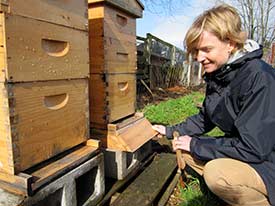Lisa H. Weasel is a molecular biologist, an associate professor of biology at Portland State University, and the author of Food Fray: Inside the Controversy over Genetically Modified Food. This 5-part interview was conducted in February of 2010, and predates last month’s decision by the USDA to deregulate the production of roundup ready alfalfa; the recent lifting of the restriction on GM sugar beets; and now, the approval of an industrial GM corn for bioethanol production.
See Also:
- Interview with Lisa Weasel: Food Fray: Inside the Controversy over Genetically Modified Food
- Interview with Lisa Weasel:-2
- Interview with Lisa Weasel: Food Fray:-3
- Interview with Lisa Weasel: Food Fray:-4
- Interview with Lisa Weasel: Food Fray:-5
Part 2; The last time I met with you was spring 2009, what has happened in respect to genetically modified food since then [as of February, 2010] ?
The Supreme Court is going to hear the first GM crop case in the United States – the genetically modified alfalfa case.
What is that case about?
It’s very significant that the Supreme Court is going to hear this one. The federal court ruled that the USDA did not prepare an adequate environmental impact statement for genetically modified alfalfa. The federal court went on to say that genetically modified alfalfa farmers who had already purchased the GM seeds could plant them but that there would be no more sales.
The parallel case with genetically modified sugar beets had the same ruling: The USDA needed to do an environmental impact statement, but in that case they allowed the genetically modified sugar beet seeds to continue to be sold. Last season about 95 percent of the sugar beet crop was genetically modified. With these two cases the very different impact of the moratorium on sales is evident.
Monsanto has consistently appealed the alfalfa case and says, “Can’t we sell the seeds in the meantime while the environmental impact statement is being done?” That’s what they want the Supreme Court to hear. So it’s not really the Supreme Court making a big decision on the issue of genetically modified foods it’s more whether or not they should have been allowed to continue to sell those seeds before they had prepared a proper impact statement. Regardless, the Supreme Court case is going to have a big impact.
The Department of Justice is also investigating Monsanto for anti-trust practices with monopolies in the seed market. That’s a case that is brought on not only by people who oppose genetically modified crops but by DuPont, Monsanto’s major competitor. DuPont has really been driving that initiative.
These are complex issues. When we talk about environmental impact a lot of the attention is really looking at the economic impacts of what happens if these traits, these genes, spread into the environment.
When did genetically modified food emerge?
The technologies that have led to genetically modified foods were largely developed in the 1970s with the advent of recombinant DNA technology. At the time, there were a lot of these ethical debates (I discuss this in my book) and concerns about crossing the species barrier and transgenic technology. At the time the main focus was with bacteria – E. coli — and putting genes from different species into bacteria. It’s the same technology today but that was when people were talking about and beginning those kinds of investigations with recombinant DNA technology.
Over the years, and the decades things have obviously changed. Monsanto had a big push starting in the 1980s to develop and use this technology in a proprietary way. There’s been a really rapid increase in the past couple of decades in using recombinant DNA technology for proprietary approaches to patented genes in plants.
Is there any labeling of GM foods in the United States?
Most labeling attempts in the United States have failed because we have such a large food system. In 2002 in Oregon we had ballot measure 27 that would have required that genetically modified food be labeled but it didn’t pass. It’s very hard to say that food in Oregon is going to be labeled when other states are not. The recombinant bovine growth hormone rBST use in milk that labeling issue has been pretty successful. There’s been a lot of litigation. Monsanto recently sold their ownership of Posilac – the rBST – to Eli Lilly. But before they sold it Monsanto pursued many lawsuits trying to get rid of that labeling.
The FDA has always been a little wishy washy about the milk labeling saying it’s allowed but you have to use certain language. You can’t imply that it’s better in any way. So even though it was allowed there was a lot of litigation about the legality of that. Milk is labeled now and it says whether or not it’s rBST free but that’s really the only instance in terms of labeling for genetically modified food crops in the US.
There’s no labeling even with this third party labeling Non-GMO Project?
That’s something new that’s going to be coming up. It isn’t widespread yet but that’s on the horizon and it’ll be something voluntary that people can buy into. I’m interested to see how that impacts consumers and what litigation then follows to get that labeling off products.
How did you get involved with issues related to GM food?
Throughout my entire training as a molecular biologist I was always surrounded by ethical debates. My undergraduate work at Harvard in the 1980s came right on the tail of these recombinant DNA debates that were centered largely in Cambridge and a lot of the key players in those debates were my professors. There were still these latent issues about P3 containment labs and if you were going to be working with recombinant DNA and putting genes into bacteria how should that be monitored and disposed of.
Then I went to Cambridge to do my Ph.D. when the human genome project was just starting and there was a big emphasis on that. Discussions around the ethics of the human genome project came up. And then of course I got interested in feminist science studies and looking critically at science and our concept of science – ‘Where do the questions that we ask come from? How does science connect up with the public?’ — All sorts of questions of scientific literacy.
All of those interests came together when I plotted out my research trajectory and said I’m very interested in ethical and equity questions relating to biotechnology. That was 1999/2000 when these issues around genetically modified food were just starting to come onto the horizon. It didn’t start out as a focus on genetically modified food, per se, but then the question of global ethics relating to biotechnology in 2001, 2002, 2003 became so important, particularly when African countries rejected genetically modified food aid. That was a huge ethical debate.
This took place in the crux of US European relationships over global politics in Iraq and these kinds of questions all came to the forefront. The title of the book Food Fray came to be because there really was this large food fray over genetically modified food. It was an issue that I had to address if I wanted to ask what kind of global ethical questions around biotechnology are out there. Even though in the United States it wasn’t a big issue– globally GM food was a very significant ethical issue. I was led into this extremely polarized area. It’s challenging to do this kind of research.
What are the main challenges?
We don’t tend to hear a lot about the bigger questions about people’s relationships to science and technology and what it usually comes down to is GM food good or bad, and is it good science or bad science. Our definitions of good science and bad science are very limited. There’s not a lot of room for depth many of these arguments.
I’m looking at scientific literacy and asking how do we do equitable research. I think that’s a lot of the problem that we get – representation. Monsanto has a section on their website about poor women farmers and how Monsanto’s technology is helping them. How do we verify those forces? How do we do good research and find out what the poor women farmers of the world really need, and how do we develop technologies in collaboration with that need?
March 14, 2011: part 3; Lisa Weasel explains the basic science behind genetic engineering; the growing use of marker assisted breeding, a powerful tool to help identify individual plant traits; and talks about her new study that examines the values and ethics in scientific literacy, as it relates to young people’s understanding of climate change issues— Weasel sees parallels with today’s debate about GM foods.
Liz Crain writes about Pacific Northwest food and drink for various print and online publications. Her book Food Lover’s Guide to Portland was published by Sasquatch Books in July 2010. She is also a fiction writer and editor at Hawthorne Books.


